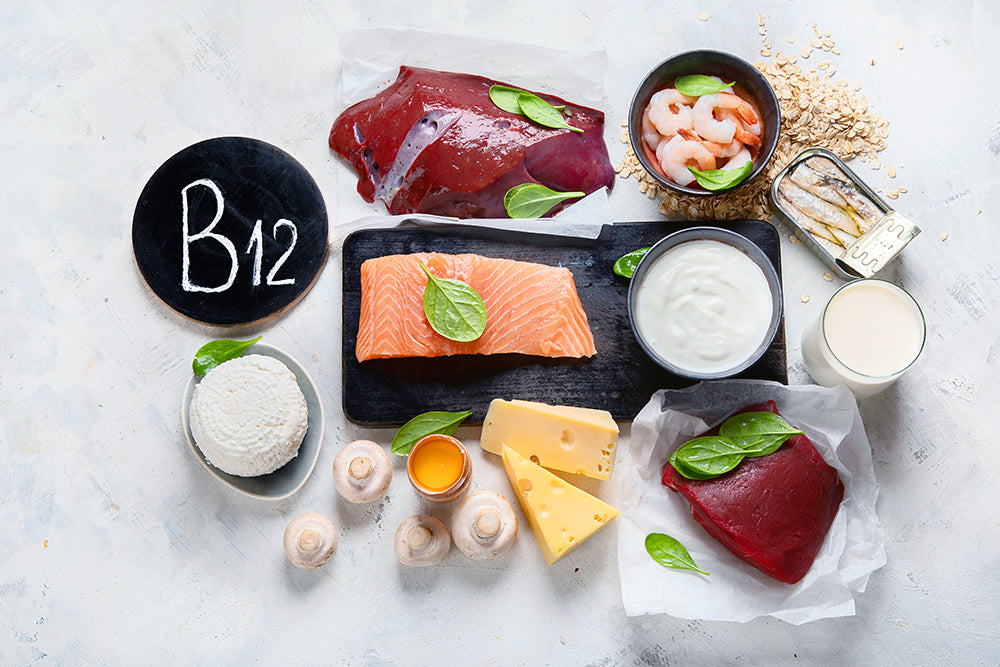
What is Vitamin B12
Why is Vitamin B12 included in Supplements Made Simple?
In my work as a GP I see blood results showing Vitamin B12 deficiency daily. It’s one the most common blood abnormalities I see. Patients with B12 deficiency often present to me with vague but bothersome symptoms that have a negative impact on their quality of life. I’ve seen first hand the life changing change Vitamin B12 supplementation can have on patients’ physical and mental health, relationships and performance at work. That’s why Vitamin B12 is a core vitamin in the Supplements Made Simple routine.
What is Vitamin B12?
Vitamin B12, also known as cobalamin, is a water soluble vitamin found in dietary animal products including meat, dairy and eggs; it’s key for red blood cell formation, DNA synthesis and nervous system development. Because normal levels of B12 are needed for these key physiological functions, being deficient can result in disabling symptoms that have a negative impact on day to day functioning. Thankfully, these can usually be reversed once B12 is replaced.
Signs and Symptoms of Vitamin B12 Deficiency Include:
- Anaemia which can result in tiredness, weakness, shortness of breath, palpitations and fatigue
- Lethargy
- Irritability and anxiety
- Brain fog, cognitive slowing, not feeling as sharp as usual
- Unsteady on feet, poor balance
- Numbness, particularly of lower limbs
- Glossitis- a painful, irritated tongue
- Low mood and depression
- Forgetfulness
- Headaches
- Tinnitus
- Dementia
- Infertility
What causes Vitamin B12 Deficiency?
- Inadequate dietary intake of Vitamin B12 is a common cause. Due to environmental, health and animal welfare concerns, many people are now adhering to vegan or vegetarian diets or simply opting to have meat free days. Indeed, processed meat is classified as a Grade 1 carcinogen (i.e. causes cancer) whilst red meat is a Grade 2 carcinogen (i.e. likely to cause cancer) as per The World Health Organisation. Due to these concerns and modern diets including more plant based options Vitamin B12 is something we’re likely to see becoming more common.
- Pregnancy and Breastfeeding; Demand for Vitamin B12 is higher in pregnancy and breastfeeding. Pregnant women are often adhering to a slightly more restricted diet due to avoiding various animal products. Vitamin B12 is water soluble meaning it’s lost in breastmilk. All of these factors mean that pregnancy and lactation are risk factors for low B12. The Supplements Made Simple Vitamin B12 is safe and recommended in pregnancy and breastfeeding.
- Pernicious anaemia, common in Northern Europe, is an autoimmune condition that results in Vitamin B12 deficiency. Cells in the stomach known as gastric parietal cells produce Intrinsic Factor. Intrinsic Factor binds to Vitamin B12 allowing for it to be absorbed by a part of the gastrointestinal tract called the ileum. However, in Pernicious Anaemia, antibodies prevent the binding of Intrinsic Factor to B12 and thus prevent absorption. Pernicious Anaemia can be tested for with a routine blood test testing for either anti Intrinsic Factor Antibodies or Anti Gastric Parietal Cell antibodies.
- Anything that reduces stomach acid production will result in less effective B12 absorption eg. gastric bypass surgery or proton pump inhibitors (PPI) medications commonly used to treat reflux. Commonly prescribed PPIs include pantoprazole, omeprazole and esomeprazole. Another common medication that results in low B12 is metformin- often used to treat type 2 diabetes and PCOS. Diseases of the small bowel like Coeliac Disease and Crohn’s Colitis and diseases of pancreas also result in B12 deficiency.
Treatment:
People with very low levels of B12 or who have severe symptoms of deficiency, will usually be offered rapid correction with intramuscular injections of B12 with their GP or practice nurse. Depending on the cause and patient preference, you may be advised to have these injections on an ongoing basis or to take a supplement at home. People who aren’t adhering to vegan or vegetarian diets may opt to include more animal products in their diet.
If you’re advised to take a Vitamin B12 supplement, mine is available in a sublingual (under the tongue) spray. B12 is readily absorbed by the rich vasculature and blood vessels under the tongue. It has a lovely fruity taste!
If you think you may have Vitamin B12 deficiency, book in with your GP or practice nurse or speak with your community pharmacist for more information.







